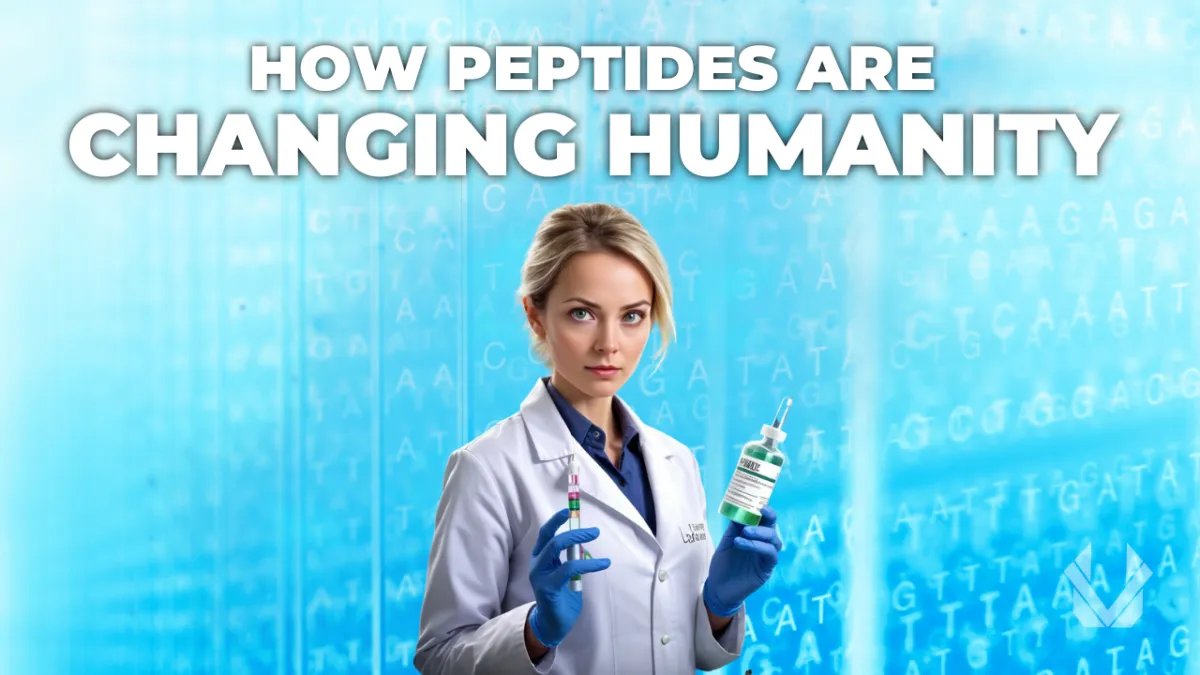THE UNYIELDING VIGOR BLOG
Our goal is to give you the most scientifically accurate and POWERFUL biological enhancement resources in the world
We're here to set new standards for truth, accuracy and effectiveness in the health industry. You'll find more value and scientific proof in our free articles than in most content you pay for.

How Peptides Are Changing Humanity - The Science SIMPLIFIED
How Peptides Are Changing Humanity - The Science SIMPLIFIED
## Introduction
This blog post aims to provide the most simplified yet comprehensive explanation of peptides you'll ever encounter. We'll delve deep into the world of bioregulator peptides, exploring their potential to revolutionize our understanding of human health and biology. By the end of this post, you'll grasp concepts that many doctors and scientific researchers are just beginning to discover.
P.S. I’ve been called the world’s leading expert on peptide science. I show you what peptides can do (including in-depth breakdowns of two of my favorite peptides) in Peptide Mastery (Free Edition) here.
## The Fundamentals of DNA and Epigenetics
Before we dive into peptides, let's establish a foundation:
- Approximately 97% of our DNA is controlled by epigenetics and the binding of molecules such as peptides.
- This 97% consists of regulatory sequences that control gene transcription.
- The methylation status of our DNA largely determines whether genes are active or silenced.
- Typically, 70-80% of our CpG sites are methylated (usually inactive), while about 10% of promoter regions are methylated (mostly active).
## What Are Peptides?
A peptide is simply a chain of two or more amino acids linked together. Generally, peptides are less than 50 amino acids in length, with some exceptions:
- Growth hormone: 191 amino acids
- Insulin: 51 amino acids
The bioregulator peptides we'll focus on are much shorter, usually consisting of two to six amino acids.
## Khavinson's Bioregulator Peptides
Professor Vladimir Khavinson (the godfather of peptides and one of my great mentors) focused on a specific class of peptides known as bioregulators. These peptides:
- Are naturally produced in our bodies but decrease with age
- Usually consist of two to six amino acids
- Help restore biological processes to an optimized state
- Can counteract the effects of biological aging, including DNA damage, telomere shortening, and increased heterochromatin
### The Cell Aging Process
To understand how these peptides work, let's look at what happens inside our cells as we age:
1. DNA is packaged into nucleosomes, then chromatin fibers, and finally chromosomes.
2. Euchromatin allows easy access to genes (like opening a folder).
3. Heterochromatin tightly packages DNA, making gene accessibility difficult (like a weight on top of a folder).
4. Over time, aging increases heterochromatin, making it harder to access our genes.
### How Bioregulator Peptides Work
Bioregulator peptides can:
1. Induce De-heterochromatization: By binding to histone proteins, they can increase euchromatin, making genes more accessible.
2. Bind Directly to DNA: They can attach to specific regions within the DNA. For example:
- Pinealon and vilon bind within the code of the FNDC5 gene.
- Epitalon binds to the TERT gene, stimulating telomerase enzymes to increase telomere length.
3. Initiate Gene Transcription: By binding to DNA sites, they can initiate RNA polymerase, which transcribes the proteins or enzymes coded by that gene.
## Specific Examples and Studies
1. FNDC5 Gene Activation:
- Vilon may activate this gene more strongly than pinealon due to more binding sites in the promoter region.
- FNDC5 codes for irisin, which can increase telomere length downstream.
2. Epitalon and Telomeres:
- Epitalon binds to the TERT gene, stimulating telomerase enzymes.
- This action extends telomeres, allowing for more cell divisions.
3. Dr. Bill Lawrence's Studies:
- Ongoing for about five years
- Showed a decrease in biological age of 12.32 years over a two-year period using a peptide protocol
- Used Horvath clock testing and telomere testing to measure biological age reversal
You can dive into more research and real-world applications in Peptide Mastery (Free Edition) here.
## Unique Properties of Khavinson's Peptides
What sets these bioregulator peptides apart:
- They form bonds with DNA and histones, unlike many larger peptides or small molecule drugs.
- They are naturally occurring, resulting in minimal side effects.
- They have a bioregulatory effect, optimizing gene expression as needed in both healthy and diseased states.
## Administration and Cellular Uptake
Bioregulator peptides can be administered through various routes:
- Orally
- Sublingually
- Intranasally
- Injection
Cellular uptake is facilitated by:
- LAT and PEPT transporters present on cells, including in the nose-to-brain barrier, stomach, and GI tract.
- CD98HC protein on the cell surface, which enhances peptide transport into the cell.
- Vilon and cartalax can act as "superchargers" on the CD98HC protein, enhancing the effectiveness of other Khavinson peptides.
## Types of Peptide Preparations
In Russia, two main types are available:
1. Peptomaxes:
- Prescription-only
- Administered in a doctor's office via IV or intramuscular injection
2. Cytomaxes and Cytogens:
- Available over-the-counter
- Cytomaxes: Naturally derived peptide extracts from cattle less than one year old, containing peptides up to 5,000 Daltons molecular weight
- Cytogens: Single, synthesized peptides identified from cytomaxes
Professor Khavinson suggests that cytogens often have a faster onset of effects, making them good for acute help, while cytomaxes provide slower but more sustainable and far-reaching benefits.
## Conclusion
The field of peptide science, particularly bioregulator peptides, holds immense potential for human health and longevity. As research progresses, we may see significant advancements in our ability to optimize biological processes, reverse aging, and enhance overall well-being.
As we continue to unravel the complexities of peptides and their interactions with our biology, we may be on the cusp of a new era in personalized medicine and health optimization.
GET OUR NEW, FREE TESTOSTERONE SUPPLEMENT GUIDE FOR 2024
Toxic Testosterone: The Hidden Health Risks of the 6 Most Common Testosterone Supplements
(Created and proven with the results of 107 scientific studies)

Unleash Your Vigor & Conquer Your Limits!
-Unyielding Vigor

